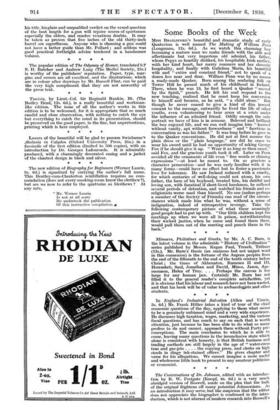Some Books of the Week
Miss BRAILSFOIM'S beautiful and dramatic study of early Quakerism is well named The Making. of William Penn (Longman, 12s. 6d.). As we watch this charming boy becoming a mature man we make friends with the able and affectionate but very imperious old admiral, his father, whom Pepys so heartily disliked, his hospitable Irish mother, with her kind heart, her merry manners and her slovenly hospitality, and finally with Gulielma Maria, his beautiful wife and entire and constant friend," not to speak of a dozen less near and dear. William Penn was by no means a ready-made Quaker. Born among the seafaring folk on Tower Hill he passed much of his childhood in Ireland. There, when he was 18, he first heard a Quaker " moved by the Spirit," preach, He felt his soul respond to the new teaching, realized that he must keep his conversion to himself and became, as he said, " a child alone." But though he never ceased to give a kind of dim inward consent to the message, outwardly he lived the life of other youths, even volunteering to bear arms at a 'crisis' under the influence of an admired friend. Oddly enough the only portrait we have of him is in armour. Beloved and brilliant the boy enjoyed life, and we can well imagine him "learned without vanity, apt without forwardness ' and " facetious in conversation as was his father." It was long before he gave in to the Quaker conventions. He did not at first assume the plain dress or the " plain language," nor did he cease to wear his sword until he had an opportunity of asking George Fox if he should give it up. ' Wear it as long as thou cant," said Fox, and the gracious youth took it off. Later on Penn avoided all the ornaments of life even " fine words or chiming expressions "—at least he meant to. On so gracious a character persecution—and he was early familiar with it in many forms—could have no effect but to foster a passionate love for tolerance. He saw Ireland reduced with a cruelty, for which centuries of well-doing could not atone, his own father, the hero of his boyhood, treated him, his dutiful and loving son, with fanatical if short-lived harshness, he suffered several periods of detention, and watched his friends and co- religionists worse used than himself. No one (unless perhaps a member of the Society of Friends) can read of the circum- stances which made him what he was, without a sense of indignation, indeed of retrospective revenge. Take the following contemporary picture of what these amazingly goodpeople had to put up with. "Our little children kept the meetings up when we were 'all in prison, notwithstanding their wicked justice, when he came and found them there, would pull them out of the meeting and punch them in the
back."


























































 Previous page
Previous page